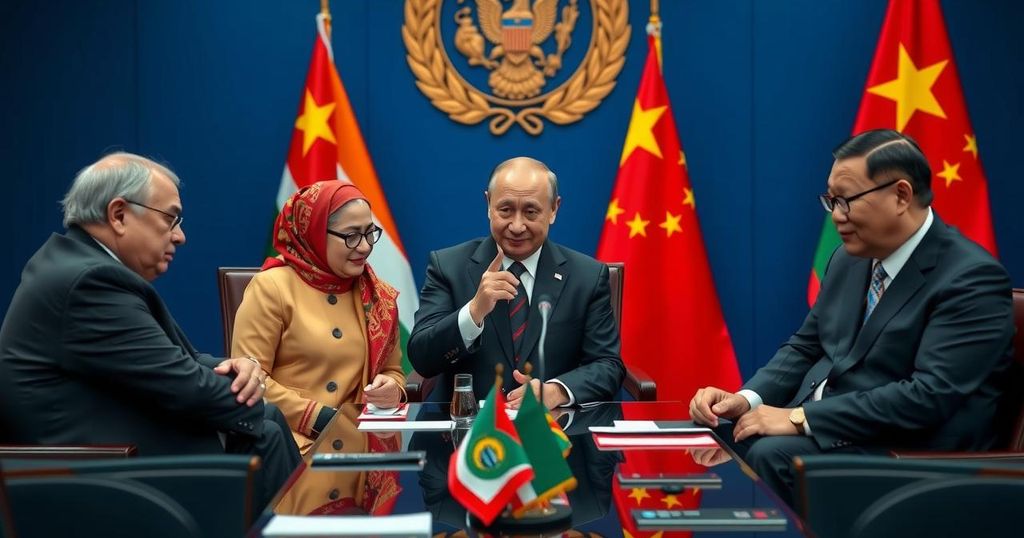India, China, and South Africa Leaders Show Support for Russia at BRICS Summit in Kazan
Indian Prime Minister Modi and Chinese leader Xi Jinping expressed significant support for Russia during the BRICS summit in Kazan, emphasizing the need for a peaceful resolution to the Ukraine conflict. South African President Cyril Ramaphosa reiterated Russia’s importance as an ally. The summit is viewed as an opportunity for Russia to showcase its international ties despite ongoing isolation due to its military actions in Ukraine, while addressing broader geopolitical issues such as a potential alternative payment system to SWIFT.
In a significant diplomatic gathering in Kazan, Russia, Indian Prime Minister Narendra Modi advocated for a swift resolution to the Ukraine conflict during discussions with President Vladimir Putin, while Chinese leader Xi Jinping lauded the enduring friendship between China and Russia. The summit, which is being attended by approximately twenty world leaders, is part of the BRICS organization that aims to showcase that Russia remains connected internationally despite the West’s attempts to isolate it due to its ongoing military actions in Ukraine. Modi expressed India’s commitment to peaceful dispute resolution, reinforcing support for initiatives aimed at restoring stability. Xi emphasized the strong ties between China and Russia, highlighting their joint efforts towards modernization. South African President Cyril Ramaphosa also underscored the value of Russia as an ally, noting historical support during the struggle against apartheid. The summit represents a notable international event for Russia since the commencement of its military offensive in Ukraine in 2022. Apart from discussions on Ukraine, leaders are expected to address topics such as establishing a BRICS-led payment system to counteract SWIFT’s dominance and the complexities of the escalating Middle East conflicts. This gathering is perceived by Moscow as a demonstration of its non-isolation and as proof of its diplomatic resilience amid ongoing global tensions. The situation surrounding the summit has necessitated heightened security measures in Kazan due to fears of attacks linked to the nearby Ukrainian border. As the BRICS group evolves since its inception with four members in 2009, it has expanded to include key emerging nations, though internal divisions remain prominent, particularly evident in the contrasting stances of India and China. Furthermore, Turkey, an existing NATO member, has expressed interest in joining the bloc, while Brazilian President Luiz Inacio Lula da Silva had to forgo his attendance due to a health issue.
The BRICS summit in Kazan illustrates the growing geopolitical assertions of non-Western nations, particularly by Russia which has found itself increasingly isolated in the international arena due to its actions in Ukraine. The presence of leaders from India, China, and South Africa at this summit symbolizes a shift towards a multipolar global power dynamic, wherein countries are seeking to establish alternative coalitions outside Western influence. The gathering aims to reinforce the narrative of Russia’s ongoing global partnerships, despite the serious accusations it faces from international bodies such as the International Criminal Court.
The BRICS summit in Kazan serves as a strategic platform for Russia, amid the ongoing Ukraine conflict, to assert its international alliances and bolster diplomatic relationships with nations such as India, China, and South Africa. The impactful statements made by leaders at the summit reflect a shared intention to promote multipolarity in global governance and to highlight the value of these alliances in light of Western sanctions and geopolitical pressure. As global alliances continue to evolve, the complexities within BRICS could play a significant role in shaping future international relations.
Original Source: www.courthousenews.com








Post Comment